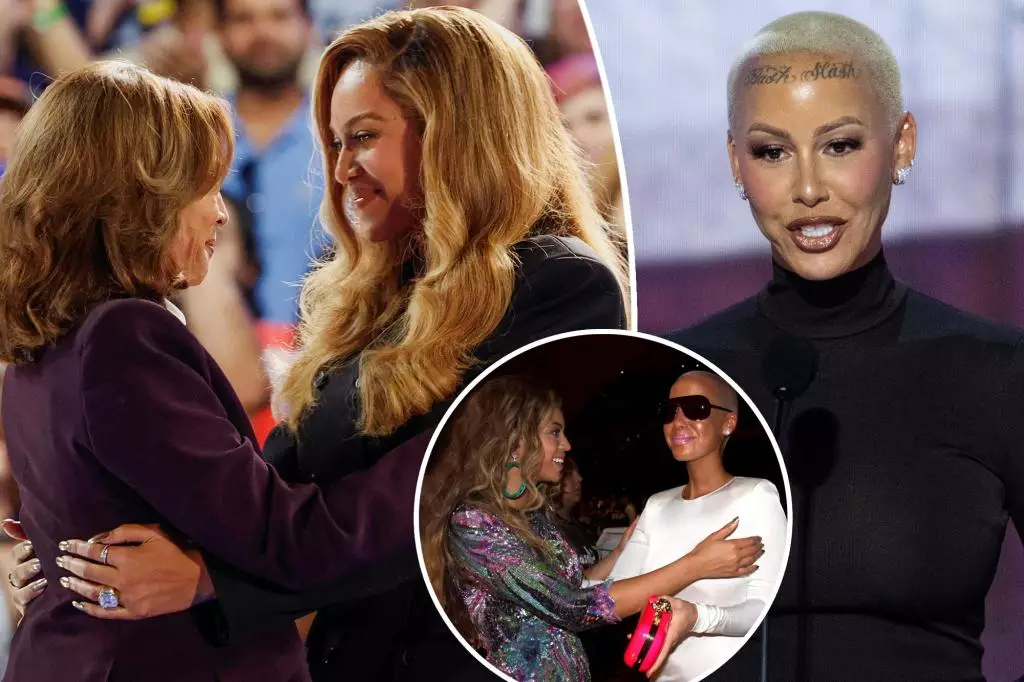In the age of social media, the line between playful banter and problematic rhetoric often blurs, as seen in the recent fallout involving Amber Rose and Beyoncé. Rose found herself at the center of a media storm after commenting on Beyoncé’s speech during a rally for Kamala Harris. Rose claimed that Beyoncé “took” her speech, leading many to question whether the comment was truly a joke or a misguided attempt to grab attention. As we delve into this situation, it’s imperative to analyze both the context and the implications, not only on the individuals involved but also on the broader landscape of celebrity discourse.
The incident unfolded when Beyoncé, at a Houston rally, lent her star power to support Kamala Harris’s presidential campaign. Speaking passionately about motherhood and the necessity of voting, Beyoncé addressed the crowd of over 20,000 attendees, emphasizing her role not just as an entertainer but as a concerned citizen. In stark contrast, Amber Rose, who has positioned herself as a prominent figure in pop culture largely through reality television and her outspoken nature, took to Instagram to voice her apparent discontent, stating, “She wanna be me so bad. Literally took my whole speech.” This comment sparked a flurry of backlash, not just from fans of Beyoncé but also from observers who perceived Rose’s remarks as desperate and unfounded.
After facing criticism, Rose attempted to explain her intentions in an interview with TMZ, asserting that she was merely “trolling.” It raises an important question: how far can we take the concept of trolling in public discourse? On one hand, humor and light-heartedness can provide a reprieve from the often heavy weight of political and social discussions. However, when someone like Rose, who has a sizeable following, trivializes a serious speech made by a respected artist and political figure, the ramifications can be substantial. Trolling can detract from critical conversations, particularly when it comes to issues like voting rights, women’s empowerment, and social justice.
The response from the public was swift and unforgiving. Critics on social media lambasted Rose for her comments, highlighting a range of issues from her credibility to her perceived delusion. One user mockingly pointed out the stark contrast in their societal and financial standings, while another drew a line between their identities—Beyoncé as a revered mother and Amber as a “baby mama.” Such reactions reflect not only societal expectations but also the pervasive issue of comparison that exists in celebrity culture. The public’s insistence on measuring worth by accomplishments or perception speaks volumes about the pressures celebrities face.
Ultimately, the incident underscores the necessity for accountability in the public domain. For Amber Rose, it serves as a reminder that words hold power, especially when uttered in the fluid arena of social media. While she may have intended to elicit laughter, the reality is that her comments have added to a narrative that many find objectionable. This situation begs the question of how public figures should navigate controversial waters. Can they maintain a sense of humor while also considering the broader implications of their statements?
The Amber Rose and Beyoncé episode highlights a crucial commentary on modern celebrity culture. It reveals how quickly a light-hearted comment can spiral into an international debate and forces us to rethink our engagement in a landscape drenched in social media interactions. Trolling can be fun, but when it risks undermining important messages—like the call to vote and engage politically—it’s time for a serious reevaluation. As we move forward in an increasingly connected world, we must cultivate a space where humor and serious discourse can coexist without overshadowing the latter.
